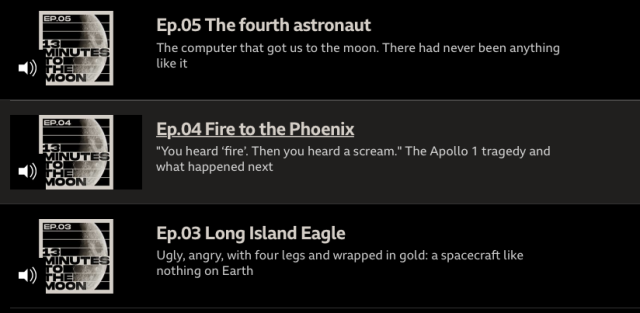With the 50th anniversary of the first Moon landing fast approaching, there's a veritable deluge of programs, events, and media of various forms, all dedicated to recapturing an astonishing moment in humanity's collective history. All of these things face a serious challenge: the Apollo missions have been revisited so many times and from so many angles, it's difficult to say anything truly new.
Go for the obvious points, and you'll face telling a big chunk of your audience things they already knew. Aim for something truly novel, and there's the risk that you'll end up focusing on an aspect that's obscure simply because it's not that interesting or important. These problems are compounded for an audience like Ars', where most of us have spent a bit of time obsessed by the space program, and the hurdles to finding some novelty grow even higher.
The promise of a new angle on a familiar subject was what got me listening to a production by the BBC's World Service entitled 13 Minutes to the Moon. This multi-episode podcast focuses on what's really the key moment in Apollo 11: the final descent and touchdown of the Eagle lander that delivered Armstrong and Aldrin to the Moon's surface.
I hadn't thought of the landing this way before, but it really was the critical point in the mission. Everything prior to this had been tested during the Apollo 10 dress rehearsal, when the lunar module descended to 15 kilometers of the Moon's surface. And, once touchdown had occurred, something pretty dramatic would have to go wrong to keep humans from stepping onto the Moon's surface. The final descent was probably the last, best chance for failure.
The goal of 13 Minutes to the Moon is to get its listeners to where they understand everything that's happened to make the descent possible and everything that needs to be done to make sure it happened. With all the pieces in place, the series will end with a rebroadcast of 13 minutes of the main communication loop between Houston and the Lunar Module.

Being produced by the BBC provides significant advantages. For one, the organization is closing in on its 100th anniversary, and so it has archival audio from all of the space race that culminated in Apollo 11. And, in pursuing new angles, the organization's name and reputation literally opened a lot of doors, as former astronauts and mission controllers welcomed the program's host into their homes for chats.
The BBC also helped ensure that the program's host would be Kevin Fong, an experienced presenter and MD who has worked with NASA on crewed spaceflight. (Do not read Kevin's Wikipedia entry unless you're mentally prepared to consider how inadequate your life choices have been.)
All that would be wasted, however, if what resulted was a program that ran over familiar ground yet another time. Some of that is inevitable. You can't cover the Moon program without revisiting the Apollo 1 fire, which triggered tremendous changes in the culture at NASA and the approach the agency took to training and hardware certification. So, the question is really one of whether there's enough new here to make treading over familiar ground worth it.
For me, there is. While I knew the mission control team was young, I hadn't considered what it might be like to be a few years out of college and given the ability to determine whether to scrub the entire mission and send Armstrong and Aldrin back to orbit earlRead More – Source
[contf] [contfnew] 
Ars Technica
[contfnewc] [contfnewc]







